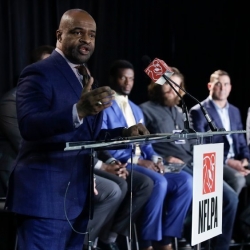The players unions for the top four major American professional sports leagues put out a joint statement on legalized sports betting this week, saying the players want to be involved in any discussion about the legalization and regulation of sports betting in the United States.
The joint statement focused on protecting the integrity of the game while deciding on new policies to oversee legal sports betting. The unions also focused on compensation for the players, stating that land-based sportsbooks and the casinos that operate them should not be the only ones profiting from legal sports betting.
The statement by the NFL, NBA, MLB, and NHL players unions echoed the sentiments that NBA Commission Adam Silver has given in recent months when discussing legal sports betting. Last month, Adam Silver recommended federal sports betting regulations and a 1% integrity fee on all gambling turnover — a suggestion which Nevada bookmakers suggested would hurt their business.
NFL, NBA, MLB Players Unions’ Statement
The players unions’ joint statement began by saying, “Given the pending Supreme Court decision regarding the Professional and Amateur Sports Protection Act (PASPA), representatives of the MLBPA, NBPA, NFLPA, and NHLPA have been working together on the legal, commercial, practical, and human consequences of allowing sports betting to become mainstream.”
“The time has come to address not just who profits from sports gambling, but also the costs. Our unions have been discussing the potential impact of legalized gambling on players’ privacy and publicity rights, the integrity of our games, and the volatility on our businesses.”
The statement suggest that the “integrity of the game”, long used to justify a sports betting ban, will still be the key motivating factor if legal sports betting happens in the United States. In 1976, Pittsburgh Steelers owner Art Rooney said at a congressional hearing on sports betting that the integrity of the game required a federal ban on sportsbooks. Rooney argued that rampant sports betting would lead to point-shaving and match-fixing, which would undermine fans’ belief in the games’ results.
Integrity of the Sport
The US Congress did not pass a ban on sports betting in the 1970s. In 1992, Major League Baseball, the National Football League, and the National Basketball league lobbied for a federal sports betting ban again.
College sports had been rocked by several point-shaving scandals in the 1980s, while the Pete Rose scandal and the Dowd Report had focused public attention on the dangers of athletes engaging in sports betting. The leagues’ lobbying efforts eventually led to the Professional and Amateur Sports Protection Act (PASPA), which banned sports betting in 46 US states. After lobbying to retain its sportsbooks, Nevada maintained a virtual sports betting monopoly, while Oregon, Montana, and Delaware retained the right to have sports lotteries (a kind of parlay).
PASPA Sports Betting Ban Might Be Overturned
The PASPA law might soon be overturned by a US Supreme Court decision, while up to 18 US states are considering changing their gaming laws to allow in-state land-based casinos to offer sports betting. If so, US sportsbooks could spring up around the United States within a matter of months. The commissioners of the NBA, NHL, and Major League Baseball have signaled a willingness to consider legal sports betting.
Now, the argument seems to be as much about compensation as it is about legality. With PASPA on the verge of being struck down, the US and Canadian sports leagues want their cut of the money.
Pro Athletes Wants Their Cut
Apparently, so do the players unions — or the pro athletes represented by the unions. Thus, they added this passage to their joint statement: “Betting on sports may become widely legal, but we cannot allow those who have lobbied the hardest for sports gambling to be the only ones controlling how it would be ushered into our businesses. The athletes must also have a seat at the table to ensure that players’ rights and the integrity of our games are protected.”
One gets the idea the integrity of the game needs to be mentioned, but the US and Canadian players unions mainly are interested in getting a cut of the action. That is fair enough, since the players put their health on the lines. The sports owners invest a lot of money to put on their form of entertainment and the players risk their health, so they think the sportsbook operators who aim to make billions should give them fair compensation.

